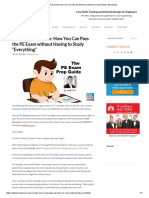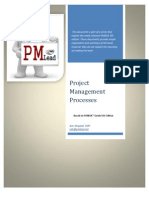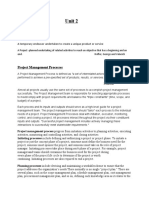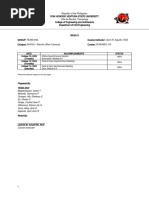0 ratings0% found this document useful (0 votes)
28 viewsLecture 5 CM
The document discusses project management processes and knowledge areas. It describes the five process groups of initiating, planning, executing, monitoring and controlling, and closing. It also outlines ten knowledge areas including integration, scope, schedule, cost, quality, resource, communication, risk, procurement, and stakeholder management.
Uploaded by
Shyra Dela CruzCopyright
© © All Rights Reserved
We take content rights seriously. If you suspect this is your content, claim it here.
Available Formats
Download as PDF, TXT or read online on Scribd
0 ratings0% found this document useful (0 votes)
28 viewsLecture 5 CM
The document discusses project management processes and knowledge areas. It describes the five process groups of initiating, planning, executing, monitoring and controlling, and closing. It also outlines ten knowledge areas including integration, scope, schedule, cost, quality, resource, communication, risk, procurement, and stakeholder management.
Uploaded by
Shyra Dela CruzCopyright
© © All Rights Reserved
We take content rights seriously. If you suspect this is your content, claim it here.
Available Formats
Download as PDF, TXT or read online on Scribd
You are on page 1/ 2
LECTURE 5: PROJECT MANAGEMENT,PROCESS
GROUPS, AND KNOWLEDGE AREAS
PROCESS GROUP
PROJECT MANAGEMENT
A logical grouping of project management processes to
The application of knowledge, skills, tools, and techniques to achieve specific project objectives.
project activities to meet project requirements is accomplished
through the appropriate application and integration of the MANAGEMENT PROCESS GROUPS
project management processes identified for the project.
A. INITIATING PROCESS GROUP
SCOPE
Those processes performed to define a new project or a new
1. Identifying project requirements. phase of an existing project by obtaining authorization to start
2. Addressing the various needs, concerns, and the project or phase.
expectations of stakeholders.
B. PLANNING PROCESS GROUP
3. Establishing and maintaining active communication
with stakeholders. Those processes required to establish the scope of the project,
4. Managing resources. refine the objectives, and define the course of action required
5. Balancing the competing project constraints (scope, to attain the objectives that the project was undertaken to
schedule, cost, quality, resources, risk). achieve.
IMPORTANCE C. EXECUTING PROCESS GROUP
1. Meet business objectives. Those processes performed to complete the work defined in
2. Satisfy stakeholder expectations. the Project management plan to satisfy the project
3. Be more predictable. requirements.
4. Increase chances of success.
5. Deliver the right products at the right time. D. MONITORING AND CONTROLLING PROCESS
6. Resolve problems and issues. GROUP
7. Respond to risks in a timely manner.
Those processes required to track, review, and regulate the
8. Optimize the use of organizational resources.
progress and performance of the project; identify any areas in
9. Identify, recover, or terminate failing projects.
which changes to the plan are required; and initiate the
10. Manage constraints (e.g., scope, quality, schedule,
corresponding changes.
costs, resources).
11. Balance the influence of constraints on the project E. CLOSING PROCESS GROUP
(e.g., increased scope may increase cost or
schedule). Those processes performed to formally complete or close the
12. Manage change in a better manner. project, phase, or contract.
SCENARIOS MANAGEMENT BODY OF KNOWLEDGE
1. Stand-alone project (outside a portfolio or program). KNOWLEDGE AREA
2. Within a program.
3. Within a portfolio. An identified area of project management defined by its
knowledge requirements and described in terms of its
PORTFOLIO component processes, practices, inputs, outputs, tools, and
techniques.
Defined as projects, programs, subsidiary portfolios, and
operations managed in a coordinated manner to achieve A. PROJECT INTEGRATION MANAGEMENT (check
strategic objectives. Portfolios may include work that is chart)
operational in nature.
Includes the processes and activities to identify, define,
PROGRAM combine, unify, and coordinate the various processes and
project management activities within the Project Management
Defined as related projects, subsidiary programs, and program Process Groups.
activities managed in a coordinated manner to obtain benefits
not available from managing them individually. Programs B. PROJECT SCOPE MANAGEMENT
include program related work outside the scope of the discrete
projects in the program. Programs may also include work that Includes the processes required to ensure the project includes
is operational in nature. all the work required, and only the work required, to complete
the project successfully.
ORGANIZATIONAL PROJECT MANAGEMENT
C. PROJECT SCHEDULE MANAGEMENT
A strategy execution framework. utilizing portfolio, program,
and project management. It provides a framework that enables Includes the processes required to manage the timely
organizations to consistently and predictably deliver on completion of the project.
organizational strategy, producing better performance, better
results, and a sustainable competitive advantage.
D. PROJECT COST MANAGEMENT
Includes the processes involved in planning, estimating,
budgeting, financing, funding, managing, and controlling costs
so the project can be completed within the approved budget.
E. PROJECT QUALITY MANAGEMENT
Includes the processes for incorporating the organization's
quality policy regarding planning, managing, and controlling
project and product quality requirements, in order to meet
stakeholders' expectations.
F. PROJECT RESOURCE MANAGEMENT
Includes the processes to identify, acquire, and manage the
resources needed for the successful completion of the project.
G. PROJECT COMMUNICATIONS MANAGEMENT
Includes the processes required to ensure timely and
appropriate planning, collection, creation, distribution, storage,
retrieval, management, control, monitoring, and ultimate
disposition of project information.
H. PROJECT RISK MANAGEMENT
Includes the processes of conducting risk management
planning, identification, analysis, response planning, response
implementation, and monitoring risk on a project.
I. PROJECT PROCUREMENT MANAGEMENT
Includes the processes necessary to purchase or acquire
products, services, or results needed from outside the project
team.
J. PROJECT STAKEHOLDER MANAGEMENT
Includes the processes required to identify the people, groups,
or organizations that could impact or be impacted by the project,
to analyze stakeholder expectations and their impact on the
project, and to develop appropriate management strategies for
effectively engaging stakeholders in project decisions and
execution.
You might also like
- Strength of Materials Module Quizes and Exam100% (2)Strength of Materials Module Quizes and Exam193 pages
- PE Exam Prep Guide - How You Can Pass The PE Exam Without Having To Study "Everything"No ratings yetPE Exam Prep Guide - How You Can Pass The PE Exam Without Having To Study "Everything"11 pages
- 2020-03-09 WITS - MECN5005A - Systems Management - Lecture 4 of 10 - Project MNGT - Shared-1No ratings yet2020-03-09 WITS - MECN5005A - Systems Management - Lecture 4 of 10 - Project MNGT - Shared-171 pages
- Assignment 1: Part 1: Project Management ExperienceNo ratings yetAssignment 1: Part 1: Project Management Experience5 pages
- Fundamentals of PSCAD & General ApplicationsNo ratings yetFundamentals of PSCAD & General Applications38 pages
- LECTURE 5 - Project Management, Process Groups, and Knowledge AreasNo ratings yetLECTURE 5 - Project Management, Process Groups, and Knowledge Areas3 pages
- Lecture 4: Project, Project Life-Cycle, and Project PhasesNo ratings yetLecture 4: Project, Project Life-Cycle, and Project Phases3 pages
- Project Management Processes Describe, Organize, andNo ratings yetProject Management Processes Describe, Organize, and27 pages
- Week 3 Project Management Process GroupsNo ratings yetWeek 3 Project Management Process Groups43 pages
- Project Management Presentation Software Engineering100% (2)Project Management Presentation Software Engineering17 pages
- 01.1 Week-01 Construction Management Process Groups etcNo ratings yet01.1 Week-01 Construction Management Process Groups etc49 pages
- PMBOK (Project Management Body of Knowledge)0% (1)PMBOK (Project Management Body of Knowledge)8 pages
- Process Group Knowledge Area Integration ProcessNo ratings yetProcess Group Knowledge Area Integration Process25 pages
- Df5vKBkaSvOTq2h7OGeMKQ Project Management EssentialsNo ratings yetDf5vKBkaSvOTq2h7OGeMKQ Project Management Essentials86 pages
- PMP Cram Sheet: Charter Defines The Project's Purpose100% (1)PMP Cram Sheet: Charter Defines The Project's Purpose2 pages
- Software Development Project Management (CSC4125)No ratings yetSoftware Development Project Management (CSC4125)36 pages
- BAB906 WK 3 Initiation Integration and Project Charters For PostingNo ratings yetBAB906 WK 3 Initiation Integration and Project Charters For Posting28 pages
- Introduction To Project Management and Entrepreneurship in Oil-ZKNo ratings yetIntroduction To Project Management and Entrepreneurship in Oil-ZK21 pages
- Manajemen Proyek Sistem Informasi (Mpsi) Knowledge Areas - Integration ManagementNo ratings yetManajemen Proyek Sistem Informasi (Mpsi) Knowledge Areas - Integration Management5 pages
- Lecture 1 - Project Management FoundationNo ratings yetLecture 1 - Project Management Foundation65 pages
- PM Chapter 04 Project Management ProcessesNo ratings yetPM Chapter 04 Project Management Processes85 pages
- BBAF 4133 - CHAPTER - III - Process Groups and Life CycleNo ratings yetBBAF 4133 - CHAPTER - III - Process Groups and Life Cycle10 pages
- Project Management: Project Management Is A Carefully Planned and Organized Effort To Accomplish ANo ratings yetProject Management: Project Management Is A Carefully Planned and Organized Effort To Accomplish A5 pages
- Digital Cities Program Tuguegarao City RoadmapNo ratings yetDigital Cities Program Tuguegarao City Roadmap51 pages
- Design Guidelines for the Establishment of IT Parks outside Metro ManilaNo ratings yetDesign Guidelines for the Establishment of IT Parks outside Metro Manila2 pages
- Urban Forms and Theories - How Do Cities ExpandNo ratings yetUrban Forms and Theories - How Do Cities Expand13 pages
- Preliminary Examination - ARSC 313 ARCH31S1 Strength of MaterialsNo ratings yetPreliminary Examination - ARSC 313 ARCH31S1 Strength of Materials20 pages
- IU04 - BDSS - Approval - From - Sharepoint - List - Exercise1 - I Putu Arista Narendra DarmaNo ratings yetIU04 - BDSS - Approval - From - Sharepoint - List - Exercise1 - I Putu Arista Narendra Darma34 pages
- 7 Ways to Get IMEI Number on iPhone If Locked 2No ratings yet7 Ways to Get IMEI Number on iPhone If Locked 21 page
- Hytera PNC360S PoC Radio User Manual V1.0No ratings yetHytera PNC360S PoC Radio User Manual V1.032 pages
- The FET-OR Connection For Power Supplies: Backup Supply, Battery Operation, diode-OR, MOSFET, Power-Supply SequencingNo ratings yetThe FET-OR Connection For Power Supplies: Backup Supply, Battery Operation, diode-OR, MOSFET, Power-Supply Sequencing3 pages
- Awareness and Perception of Digital Broadcasting Among Broadcast Journalists in Kaduna StateNo ratings yetAwareness and Perception of Digital Broadcasting Among Broadcast Journalists in Kaduna State27 pages
- Encapsulation, Inheritance and Polymorphism.pptxNo ratings yetEncapsulation, Inheritance and Polymorphism.pptx41 pages
- IR.21 Document-Grameenphone (BGDGP) - 2023-03-30No ratings yetIR.21 Document-Grameenphone (BGDGP) - 2023-03-3027 pages
- Talent Acquisition Director Resume Randi CaseyNo ratings yetTalent Acquisition Director Resume Randi Casey2 pages
- Batangas State University College of Engineering, Architecture & Fine ArtsNo ratings yetBatangas State University College of Engineering, Architecture & Fine Arts6 pages

















































































































